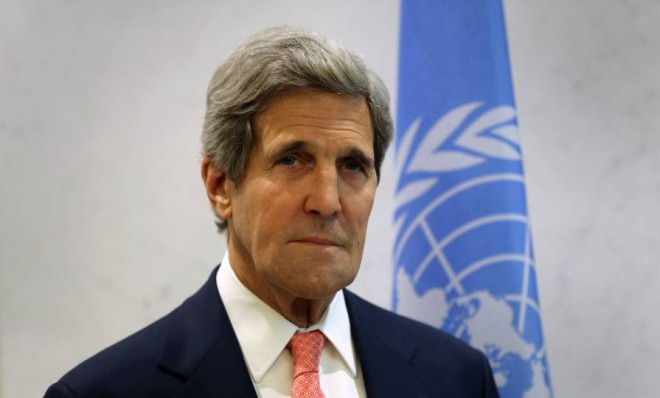Can John Kerry really broker Arab-Israeli peace?
So many others have tried and failed. And so much could still go wrong.


A free daily email with the biggest news stories of the day – and the best features from TheWeek.com
You are now subscribed
Your newsletter sign-up was successful
On Monday evening in Washington, Israeli and Palestinian negotiators are sitting down for the first time in three years to try and hash out a Mideast peace plan. The resumption of peace talks follows months of intense face-to-face diplomacy from Secretary of State John Kerry.
Both Israeli Prime Minister Benjamin Netanyahu and Palestinian Authority President Mahmoud Abbas "have demonstrated a willingness to make difficult decisions that have been instrumental in getting to this point," Kerry said in a statement on Sunday. "We are grateful for their leadership."
The difficult decision that removed the final obstacle to renewed peace negotiations came on Sunday, when Netanyahu's cabinet voted to release 104 Palestinian prisoners jailed in Israel since before the 1993 Oslo Peace Accord. The prisoners will be released in stages, if and when the peace talks hit certain marks.
The Week
Escape your echo chamber. Get the facts behind the news, plus analysis from multiple perspectives.

Sign up for The Week's Free Newsletters
From our morning news briefing to a weekly Good News Newsletter, get the best of The Week delivered directly to your inbox.
From our morning news briefing to a weekly Good News Newsletter, get the best of The Week delivered directly to your inbox.
Like much leading up to these talks, says the Associated Press' Karin Laub, the prisoner release "is a key part of the Kerry-brokered deal." But "Kerry's success so far has been only to get the parties back to the table," Laub adds, and neither the Palestinians nor the Israelis seem particularly upbeat that these next six to nine months of peace talks will succeed.
There are a lot of things that could go wrong, and a lot of seemingly insurmountable issues that could derail the talks: for instance, whether Palestinians will have the right to return to lands Israel occupied in its 1948 foundational war, whether Israel keeps all of Jerusalem or the Palestinians get the eastern portion for their capital, and what happens to the Israeli settlements. The decades of unsuccessful talks have left a general blueprint for a final settlement, but these are different leaders and different times.
Still, the fact that high-level Palestinian and Israeli negotiators are coming back to the table is "no small accomplishment for a secretary of State whose fixation with breaking the Israeli-Arab deadlock has produced snickers from some who say Kerry is chasing visions of a grand legacy down a dead-end alley," says Michael Crowley at TIME. That said, there's only so much Kerry can do.
"At some point, the central player in this saga is not going to be Netanyahu, it's not going to be Abu Mazen (Abbas), it's not going to be John Kerry, it's going to be Barack Obama," the University of Maryland's Shibley Telhami tells Reuters. "The effort required is above Kerry's pay grade," he adds, to TIME. "At some point, the president will have to step in big. If I were in Kerry's shoes, I would not go in too deep without getting Obama's commitment to back him up. I am not sure he has yet."
A free daily email with the biggest news stories of the day – and the best features from TheWeek.com
Obama certainly "felt burned by the peace process in his first term," and that may temper his enthusiasm to wade in again in his second term, says TIME's Crowley. "To be sure, Obama hasn't been totally absent from this flurry of peace-process activity," and he could even be playing a bigger role than is publicly known.
But the siren song of Mideast peace has sucked in, and spit out, the last few presidents, Crowley says, and while Obama could surprise everyone, "many jaded observers of failed efforts at peace in the Holy Land won't believe it until they see it."
So at least for now, the ball is in Kerry's hands. And Kerry seems determined to do his part. "He has invested so much in this now, and even though expectations are so low, he is in an investment trap, he really can't let it fail now," former U.S. peace negotiator Aaron David Miller tells Reuters. "Which means he'll have to go to extreme lengths to keep this thing afloat."
Peter has worked as a news and culture writer and editor at The Week since the site's launch in 2008. He covers politics, world affairs, religion and cultural currents. His journalism career began as a copy editor at a financial newswire and has included editorial positions at The New York Times Magazine, Facts on File, and Oregon State University.
-
 What are the best investments for beginners?
What are the best investments for beginners?The Explainer Stocks and ETFs and bonds, oh my
-
 What to know before filing your own taxes for the first time
What to know before filing your own taxes for the first timethe explainer Tackle this financial milestone with confidence
-
 The biggest box office flops of the 21st century
The biggest box office flops of the 21st centuryin depth Unnecessary remakes and turgid, expensive CGI-fests highlight this list of these most notorious box-office losers
